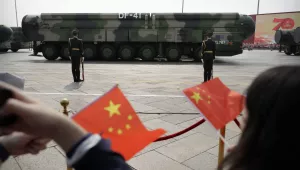Independent Task Force Report No. 59
No relationship will be as important to the twenty-first century as the one between the United States, the world’s great power, and China, the world’s rising power. China's development is directly transforming the lives of one-fifth of the world's population, and is otherwise influencing billions more. China's rapid economic growth, expanding regional and global influence, continued military modernization, and uneven human rights record are also shifting the geopolitical terrain and contributing to uncertainty about China's future course. After thirty-five years of "engagement", the United States and China have a relationship that was truly unimaginable two generations ago. At the same time, there are some Americans who believe that China's strategic interests are incompatible with those of the United States.
The Council on Foreign Relations established an Independent Task Force to take stock of the changes under way in China today and to evaluate what these changes mean for China and for the U.S.-China relationship. Based on its careful assessment of the developments in the country and China's likely future trajectory, the Task Force recommends that the United States pursue a strategy focused on the integration of China into the global community and finds that such an approach will best encourage China to act in a way consistent with U.S. interests and international norms. The Task Force concludes with a series of recommendations aimed to reinforce recent efforts to deepen U.S.-China cooperation. The overall message is that while the United States should not turn a blind eye to the economic, political, and security challenges posed by China’s rise and should be clear that any aggressive behavior on China's part would be met with strong opposition, U.S. strategy toward China must focus on creating and taking advantage of opportunities to build on common interests in the region and as regards a number of global concerns.
Task Force Chairs:
Carla A. Hills
Dennis C. Blair
Project Director:
Frank Sampson Jannuzi
Task Force Members:
Roger C. Altman, Peter E. Bass, Dennis C. Blair, Harold Brown, Ashton B. Carter, Charles W. Freeman III, Aaron L. Friedberg, Paul Gewirtz, Maurice R. Greenberg, Harry Harding, Carla A. Hills, Frank Sampson Jannuzi, Michael H. Jordan, Virginia Ann Kamsky, David M. Lampton, Nicholas R. Lardy, Herbert Levin, Cheng Li, Winston Lord, Xiaobo Lu, Evan S. Medeiros, James C. Mulvenon, Andrew J. Nathan, Stephen A. Orlins, Evans J. R. Revere, Bradley H. Roberts, Alan D. Romberg, Randy Schriver, Wendy R. Sherman, Arthur Waldron
Please see the pdf and link below for the full text of this report:
Summary
Although China's future is uncertain, "further integrating China into the global community offers the best hope of shaping China's interests and conduct in accordance with international norms on security, trade and finance, and human rights, and encouraging collaboration to confront the challenges both countries face," finds a Council-sponsored Independent Task Force on U.S.-China relations.
The U.S.-China bilateral relationship is important and will shape international security in the 21st century, says the report, U.S.- China Relations: An Affirmative Agenda, A Responsible Course, chaired by former Commander-in-Chief of the Pacific Command Admiral Dennis C. Blair (USN, Ret.) and former U.S. Trade Representative Carla A. Hills. "The United States should approach China with an affirmative agenda from a position of confidence."
"Taking stock of U.S.-China relations, the Task Force finds that China's overall trajectory over the past thirty-five years of engagement with the United States is positive. Growing adherence to international rules, institutions, and norms--particularly in the areas of trade and security--marks China's global integration. Yet even as China has become more integrated, it has also grown more powerful and assertive in the international arena, bringing into sharper focus those areas where China's interests and those of the United States diverge, including how best to pursue certain nonproliferation objectives; respect for human rights (especially political liberty, freedom of speech, and religious freedom); and the limits on sovereignty to protect a nation from outside intervention when that nation grossly violates international norms (e.g., Sudan)."
The United States' focus on Iraq and other issues means that China is not receiving the attention it deserves, finds the Task Force. "While the points of convergence have increased, a political consensus about the appropriate policy toward China has come under strain. Rebuilding that consensus should be a major priority of the U.S. government, and specifically of the president, because the challenges confronting the United States today--whether combating terrorism, limiting the proliferation and spread of weapons of mass destruction, reining in North Korea's nuclear ambitions, ensuring energy security, or protecting the global environment--will be more effectively managed with China's cooperation than without."
Economic Relations: "Getting the economic relationship with China in order requires a blend of domestic reforms in the United States as well as in China, bilateral initiatives, and efforts to integrate China more completely into the international economic system." The Task Force finds that China has failed to adequately protect American intellectual property, that high-level corruption is endemic, and that China needs to permit its currency to move in response to market forces. However, the Task Force argues that current attempts to pressure China into raising the value of its currency by threatening tariffs are misguided, and could backfire.
Security: The United States should advance its interests in Asia with a strategy that combines both balance-of-power and concert-of-power tactics. "The best way for the United States to ensure that its security interests are not compromised by China's growing military capabilities is to sustain America's space, air, and naval superiority and maintain and enhance its alliances in East Asia. But even as the United States continues to modernize its own military forces and strengthen security partnerships with China's neighbors, the United States should also promote military dialogue, transparency, and coordination with China." Forging a closer security relationship with China requires building habits of cooperation and coordination as a mechanism for reducing mutual suspicions and broadening mutual interests.
Taiwan: The policies of "dual restraint" and "dual assurance" should continue, "deterring Chinese aggression and opposing Taiwan's steps toward independence while at the same time assuring China that the United States does not seek to perpetuate Taiwan's separation from the mainland and assuring Taiwan that the United States does not seek to pressure it into negotiating a final resolution."
Japan: "In order for a strategy of integrating China into the community of nations to succeed, the United States must work in concert with its Japanese ally. So long as Sino-Japanese relations are marred by deep mistrust, Japan's ability to assist in China's integration will remain limited and efforts by Japan to play a more active role in global security affairs--efforts championed by the United State--will tend to cause alarm in Beijing. It is therefore in the interest of the United States for Japan and China to build more cooperative relations."
"The Task Force believes integration of China into the global community represents the best strategy to encourage China to act in ways consistent with U.S. interests and international norms. Sustaining support for a close, candid, and cooperative relationship can best be achieved by articulating a positive message--a call to realize the potential benefits of working with China on issues such as nuclear nonproliferation and protecting the global environment."
Carter, Ash, Dr. Carla A. Hills and Frank Sampson Jannuzi. “U.S.-China Relations: An Affirmative Agenda, A Responsible Course.” Council on Foreign Relations Press, April 2007
The full text of this publication is available via Council on Foreign Relations Press.





